Disclosure: Meeple Mountain received a free copy of this product in exchange for an honest, unbiased review. This review is not intended to be an endorsement.
Crusader Kings comes from roleplaying game publishers Fria Ligan (Free League), who saw a breakout hit with their Tales From the Loop RPG and whose upcoming Alien RPG holds a lot of promise. How did they fare with their first ever board game? Read on to find out!
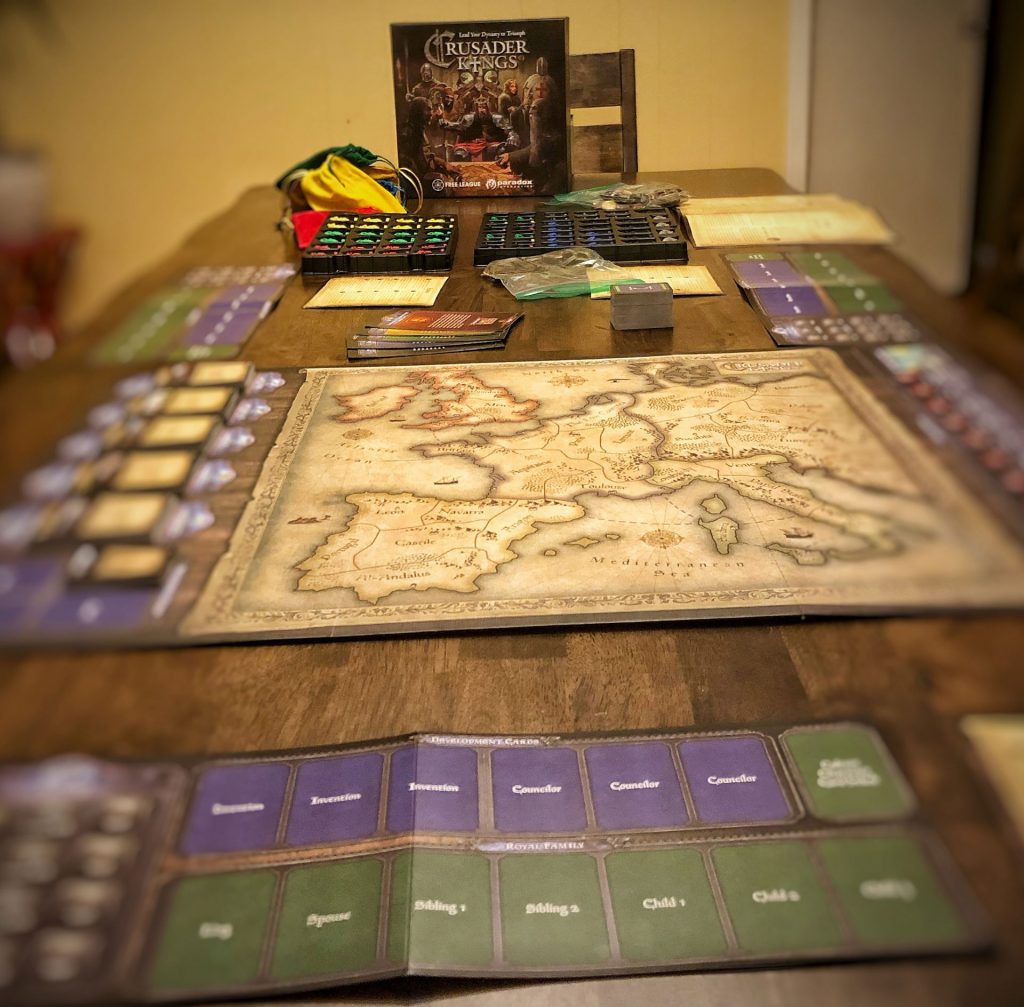
From the Computer Screen…
For those who aren’t familiar, Crusader Kings: the Board Game is based on the Crusader Kings video game franchise put out by Swedish developers Paradox Interactive. The video game is one of Paradox’s “grand strategy” titles, a continent-spanning historical sandbox in which plans take decades, if not centuries, to come to fruition. As the name may imply, Crusader Kings focuses on the time of the Crusades in feudal Europe and, like Paradox’s other games, it is notoriously weighty, with a single campaign often taking 50-100 hours to complete for even a skilled player.
One of the things that makes the video game stand out is that, unlike many strategy games, the player doesn’t take the role of a faceless immortal god-king, but a succession of all-too-human rulers from the same royal family. Each character in the game — and there are hundreds at any given time — has their own personality: a collection of positive and negative traits that change depending on various actions and events, and these traits can help or hinder a wide variety of actions. The characters feel alive in a way that many strategy games just can’t hope to achieve. The result is that Crusader Kings is the premiere medieval dynastic simulation game on the market. That may sound as dull as the real Dark Ages, but it’s worth remembering that millions of people tuned in to watch the rise and fall of the Starks and Lannisters. It shouldn’t come as any surprise that one of the most popular mods (player-made variants) for the game recreates the world of Westeros; Crusader Kings is as much about the machinations of courtiers and nobles as it is the clash of armies.
…To the Table…
Half in the Bag
That background is important because the board game version of Crusader Kings stays close to its video game roots. It’s an ambitious, sprawling game with lots of pieces and rules, which makes it difficult for a new player to get a grip on. While it may look like an area control game at first glance, it’s anything but: the real focus here is on managing your dynasty. Each player is in charge of one of five historical houses of Europe; the exact family name and their specific starting conditions will vary depending on which scenario is being played.
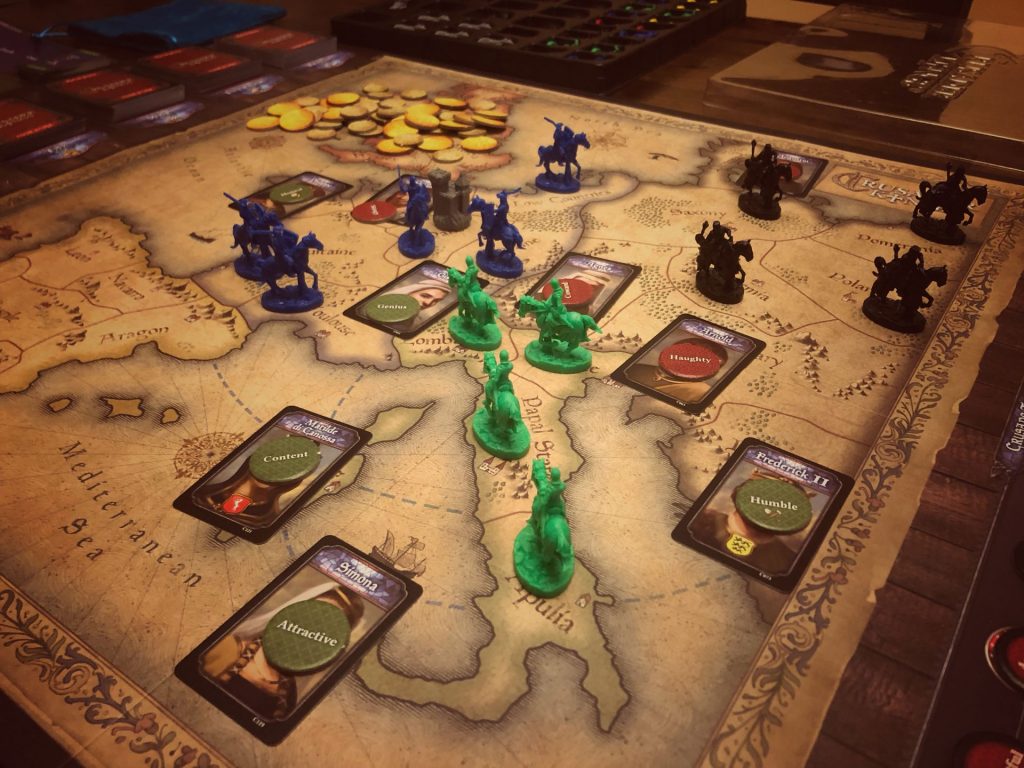
Of the various resources players will start with — the gold, territories, and castles that make this seem like a slightly fancier game of Risk — the most important is actually the bag full of cardboard Trait tokens that represent, for lack of a better word, the personality of your dynasty. These Traits can be positive, like “Genius”, or negative, like “Drunkard”. Players will be drawing Traits randomly from this bag almost any time they take an action: draw a positive trait and succeed, draw a negative trait and fail. The set of Traits in this bag will evolve over time as successive monarchs bring their own particular skills (or weaknesses) into the mix. Whenever a Trait draw is needed, players can usually spend gold to get more chances or reduce the number of chances another player gets, with some actions requiring multiple successes.
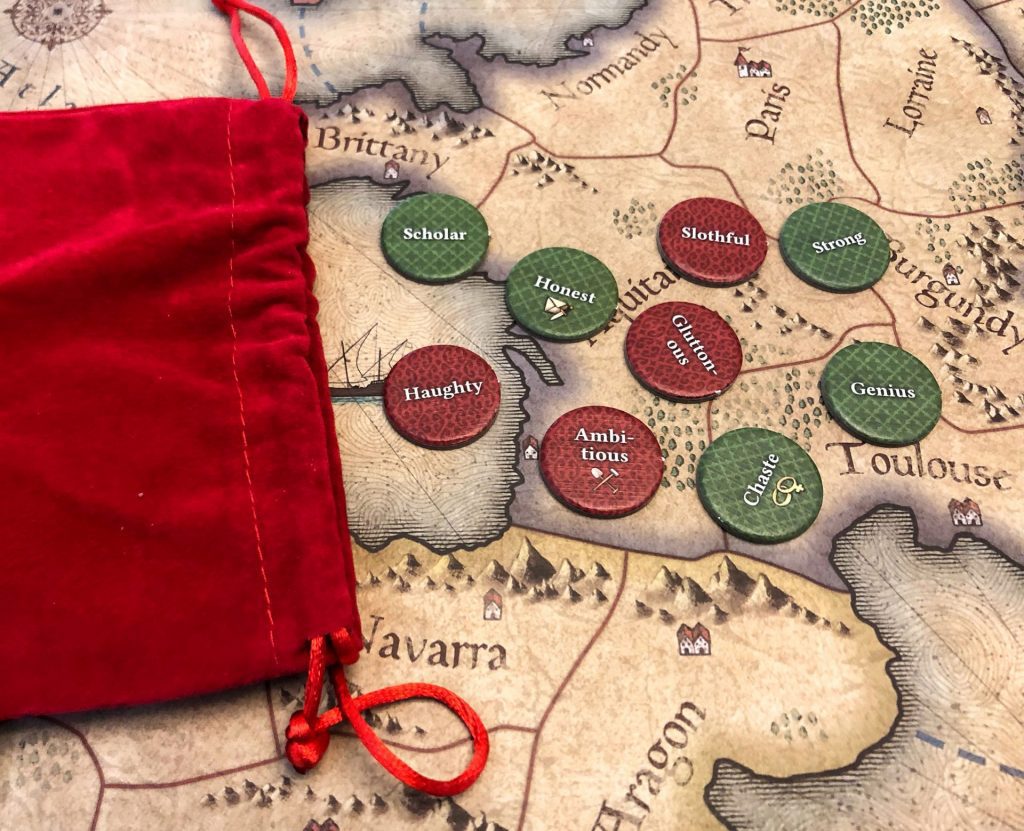
Making the Card Decisions
The game is played in 3 Eras, each broken into 3 Rounds. At the start of an Era, all players will draw a hand of 8 Action cards. These cards are separated by type, which also determines how many of each can be drawn, so players can customize their hand to the general strategy they’d like to pursue for the Era. Need money? Make sure to draw a few Tax cards. More interested in bashing your opponents? War cards will suit your needs nicely. Every player will also have to play exactly one Crusade Card every Era, risking the life of a family member to hopefully progress along a track which offers bonuses for each space claimed.
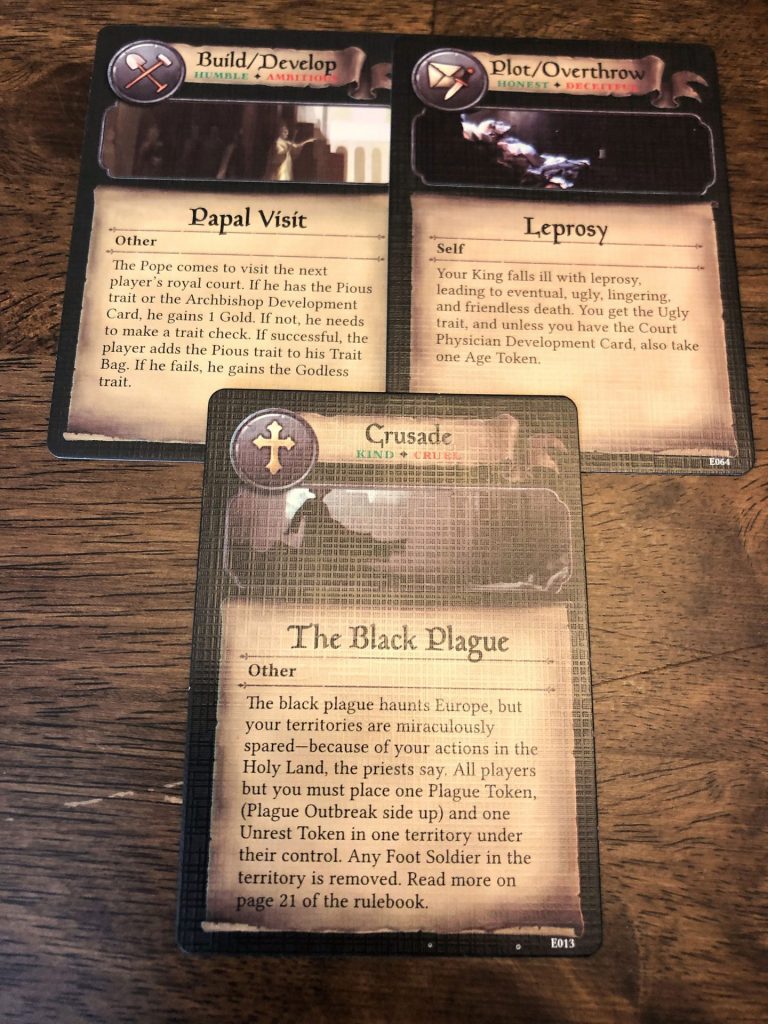
Each card is composed of an Action based on the type of card – for example, all War cards allow you to either Mobilize your forces or Invade a territory – as well as an Event. Similar to games like Twilight Struggle, these Events trigger when the card is played, and are often either bad for you or good for your opponents. Finding the balance between taking the Actions you need while not giving your opponents beneficial Events is one of those always-satisfying puzzles, and it’s particularly tricky here since each player will choose their two Action cards at the start of the Round (playing a total of 6 of the 8 cards in hand per Era).
That timing restriction makes all the decisions that much harder because, in addition to maximizing your gains without giving anyone else a boost, you’re also trying to anticipate what the other players’ cards might hold. And keep in mind that most of the actions you can take still require a Trait draw to succeed, meaning that even the best-laid plans are subject to Lady Luck’s approval.
God Rest Ye Married Gentlemen
New players will be drawn to the War cards, and with good reason. It feels nice to see your forces building up before slowly spreading across the map, though the fact that a player can only hold a maximum of 8 territories at a time means that there isn’t much spreading to do. That’s not all: just like in the real world, war in Crusader Kings is dreadfully slow, shockingly expensive, and often turns into an exhausting tug-of-war where neither side can keep the advantage. It’s important, sure, and a tight game can be won or lost on the backs of your infantry. But if you want to win reliably, you’ll need to master the marriage game.
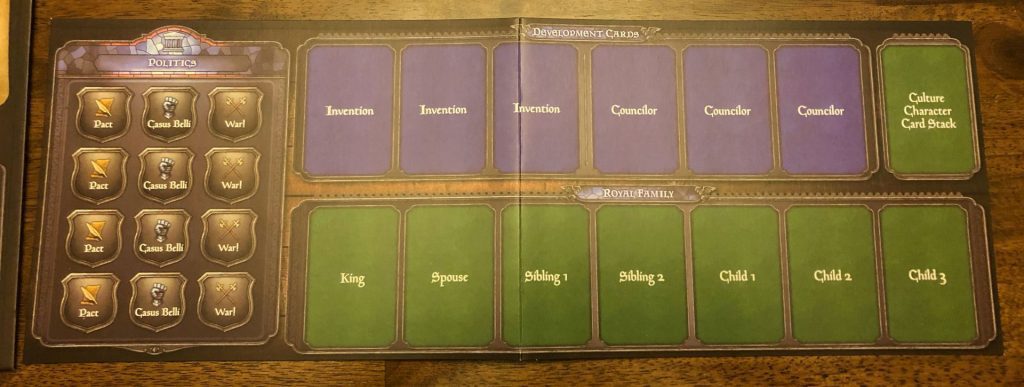
Each Round, players are able to attempt a single marriage for their dynasty, contingent on a successful Trait draw. Marriages serve several functions: they’re crucial for ensuring the growth of your dynasty, as children are only born to married couples; they can be used to create alliances between dynasties and/or independent territories; and they can potentially introduce new Traits to your family, though Traits won’t be added to the bag until that character or their spouse is on the throne.
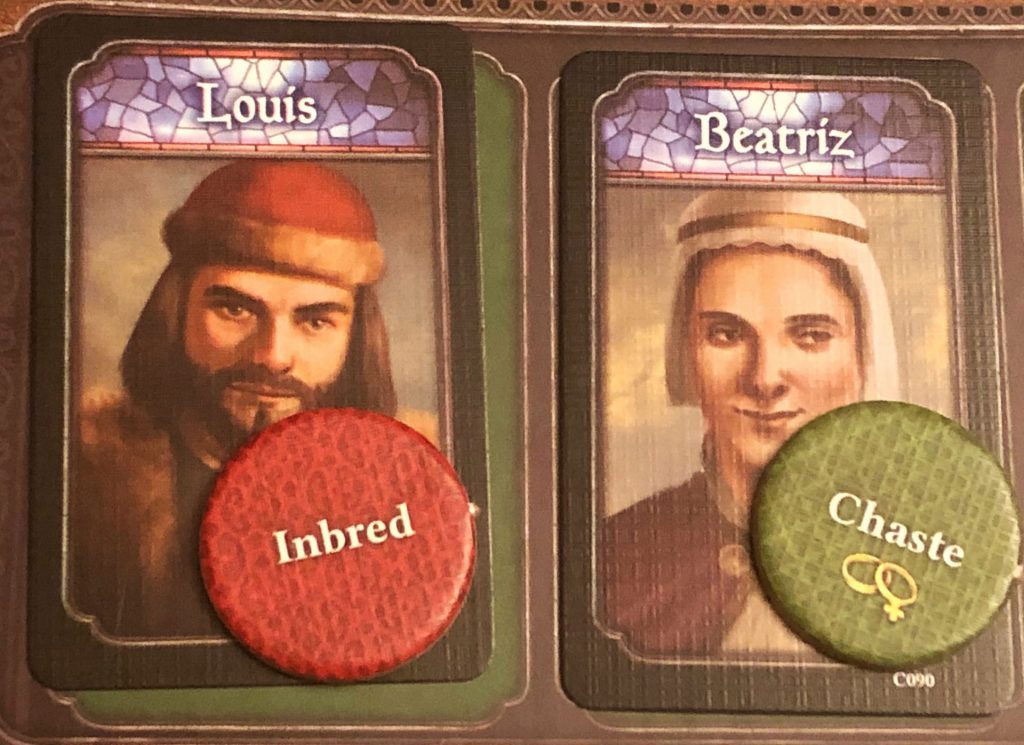
Your family’s throne will change hands several times throughout the game as rulers die of old age, mishap, or a violent death in the Crusades. Setting yourself up with a strong heir — preferably married, with positive traits on both characters — can help keep your empire from falling into ruin. A succession crisis, which occurs when a ruler dies and there is no suitable heir, can be extremely painful; your dynasty will lose half of its gold and half of its lands, then draw a random new leader with a random trait. Let’s be clear: “random” is not the word you want applied to your illustrious bloodline, so make sure to plan for your family’s future!
The Eras of Your Ways
A game of Crusader Kings ends when one of two conditions is reached: either 3 Eras have been completed or a single player reaches the 10th space on the Crusade track. The latter is much more common at higher player counts. Once the game is complete, each player gets a point for each territory they control, with 4 extra points on offer for completing various achievements (such as building the most castles, with a minimum of 3 needed to even be considered). The differences between winners and losers are almost always razor-thin, separated by a mere point or two.
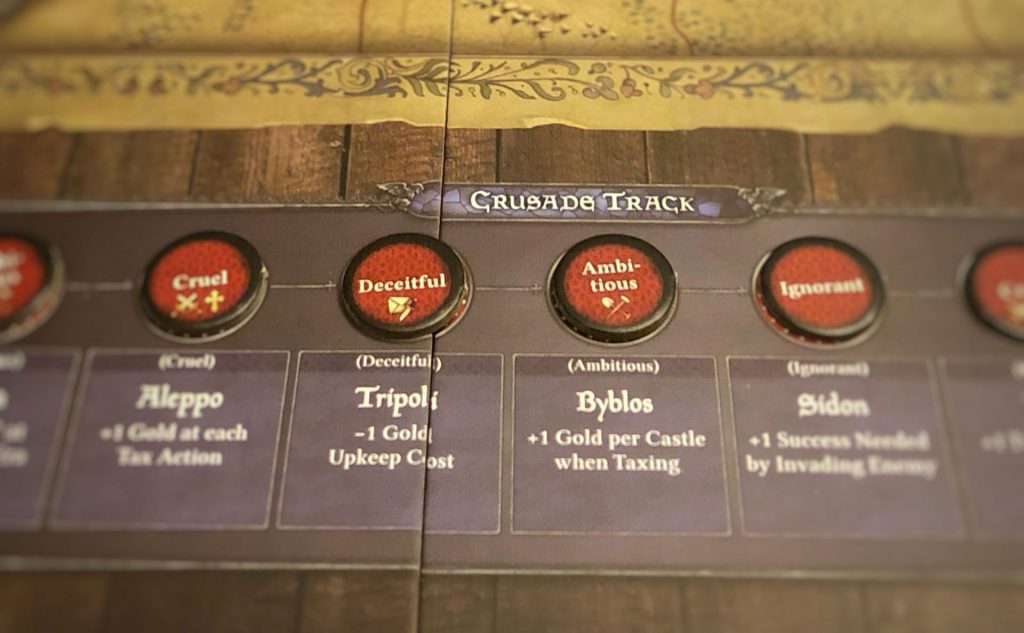
After investing several hours into a dense game, it can feel frustrating to miss out on a win by a single point or, worse, a tiebreaker. On the other hand, it can feel exhilarating to snatch victory in the eleventh hour, especially if your dynasty’s path to glory was particularly rocky. Since starting setups are asymmetric, some players may have an advantage in certain scenarios, but ultimately this doesn’t feel too unfair. Advantages are often balanced out by weaknesses, and like most diplomacy-oriented games, it’s hard to throw your weight around without making enemies. Every source of points is open information, so if a dynasty looks to be close to reaching an achievement, the others can team up to knock them down a peg.
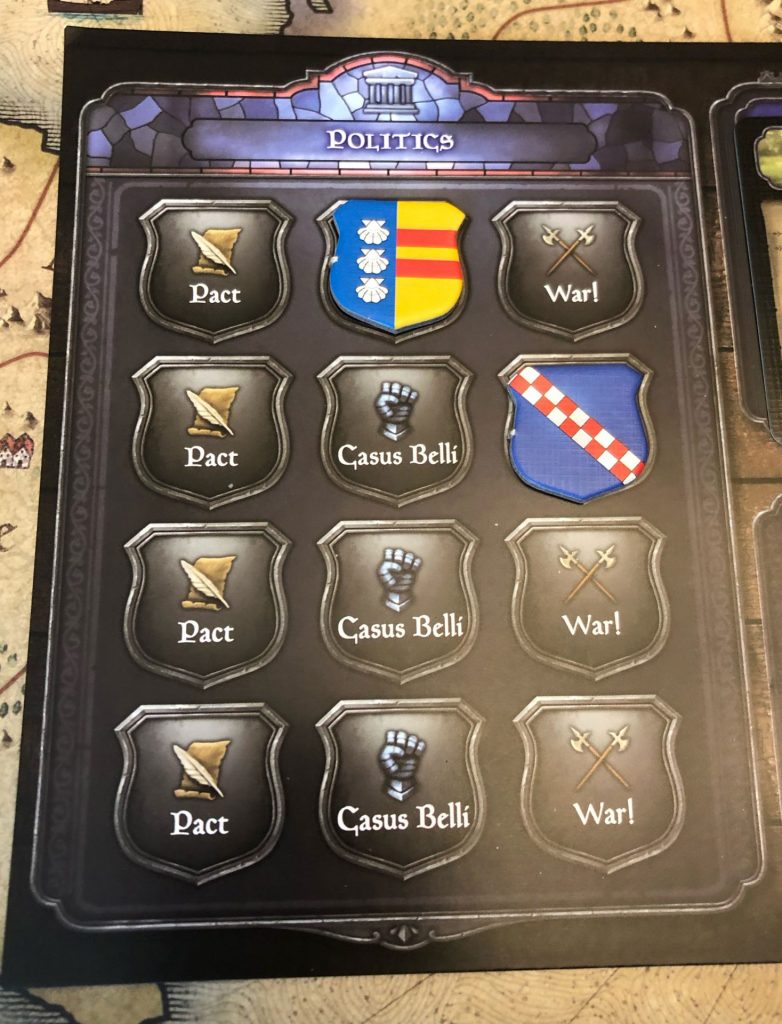
Splendid Isolation
Crusader Kings offers rules for solo and two-player modes, including both competitive and cooperative options for two players. As with many other games, these involve playing against loosely-scripted “bot” opponents with various “personalities” that help determine how their cards resolve, though the player(s) will still need to do a lot of impartial interpreting. In a game this huge, that seems like it would be a chaotic mess — and it is! It’s also a fun challenge, particularly in some of the more complicated scenarios. While the bots don’t always make optimal choices, they can be surprisingly effective when the cards line up right.
One downside to playing by yourself is that there is a lot of upkeep to manage. That can lead to lengthy, brain-frying games where your individual accomplishments get lost amid a sea of tokens and cards. Smaller games with fewer than 5 dynasties can help alleviate this somewhat without entirely sacrificing the experience. If you’re looking for a deep solo/partner game, Crusader Kings is a reasonable choice, ranking near Mage Knight in terms of complexity if not in scope.
…To Your Collection?
It may be hard to believe considering the length of this review, but there’s still so much I haven’t touched on, like the Chinatown-style trading between players, the casus belli mechanic that impacts who can wage war, or the various councilors and inventions that can help shape your dynasty’s strategy. Crusader Kings is a massively complex game that still somehow fits into a (long) evening, and that compact complexity is a double-edged sword.
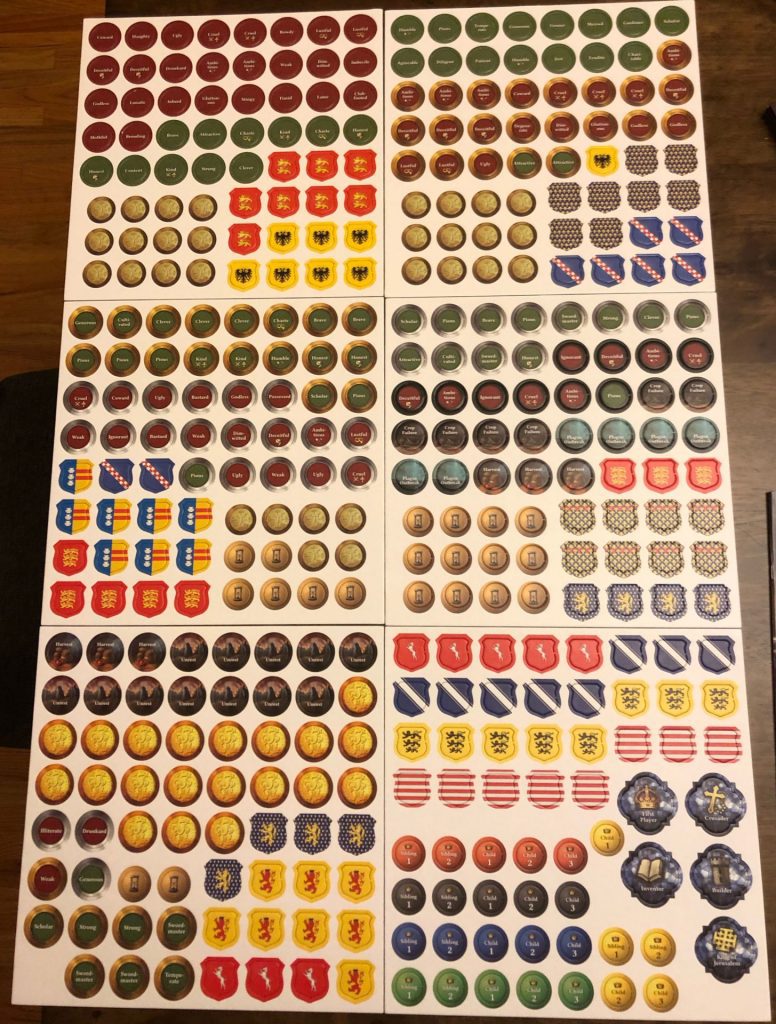
The first few games are painful, especially for casual gamers, because the amount of options and things to consider are astronomical. It doesn’t help that there are some serious rules issues, including clearly contradictory information, incomplete explanations, and lots of ticky-tacky rules that feel like they were put in place to prevent a specific problem which may not ever repeat. Keeping track of it all is nigh-impossible, and unless you play it every day, you’ll likely find yourself unintentionally using a different set of rules every game. This is the kind of game that benefits from significant house ruling, cutting away the chaff and focusing on what feels fun.

While the rules are a mixed bag, the game still has some positive traits. The action-selection aspect is really excellent; I love that you can adapt your hand to your goals and there are some clever strategies that aren’t immediately apparent. The bag-building mechanic seen in games like Quarriors is one I’ve always liked and it works perfectly in Crusader Kings on both a mechanical and a thematic level, particularly when combined with the marriage and dynasty management elements. At first you may not care too much whether your spouse is Illiterate, yet over time an untended family tree will bear bitter fruit, sowing your bag with a crop of red Traits.
That can lead to some truly wonderful stories, like the king whose Ambitious Trait seemed to always come out of the bag at the worst possible time, his hubris haunting the land long after his reign. Or the many children of Philippe the Amorous, each of whom was uniformly terrible and married equally awful spouses, yet who stubbornly managed to survive each time they were put in harm’s way (much to my chagrin).
Crusader Kings is full of little tales like those. Some of them may not make much sense, random draws and unexpected events being what they are, but when the pieces fall into place it’s quite satisfying. Much like the video game, the world feels weirdly alive simply because it feels so lively and weird. If you’re the kind of person who likes making up a story to suit the events of the game or is looking to scratch that RPG itch, who’s willing to laugh at their own misfortune, and who doesn’t mind wrestling with the game to get the most out of it, you might find that the Crusader Kings board game has a lot to offer you.


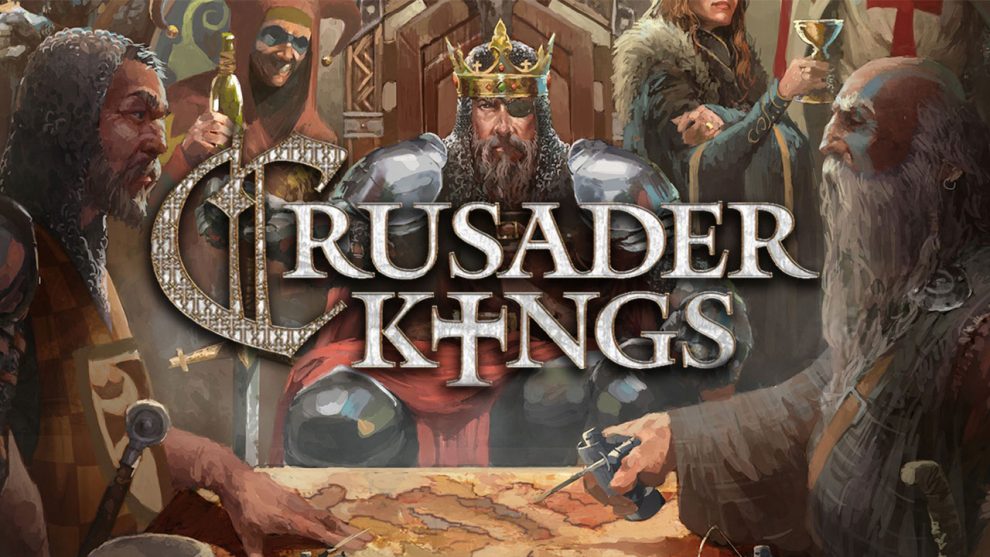







Add Comment